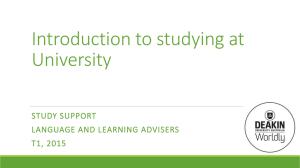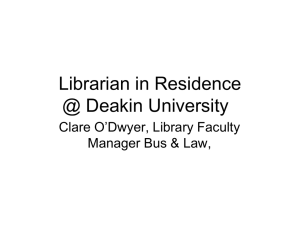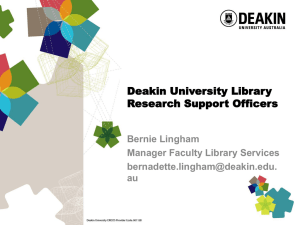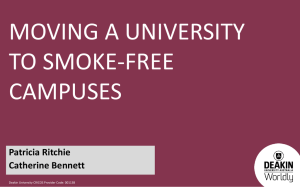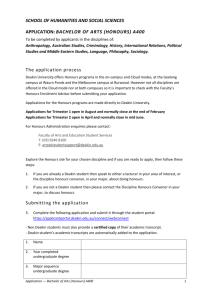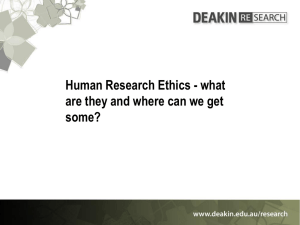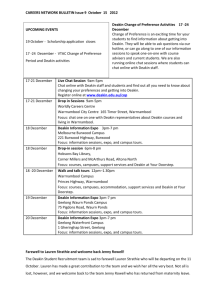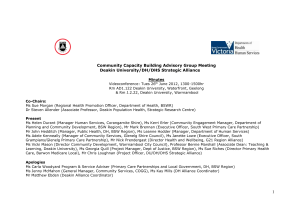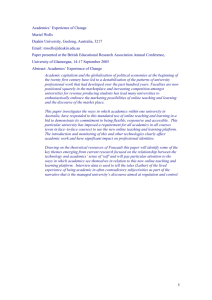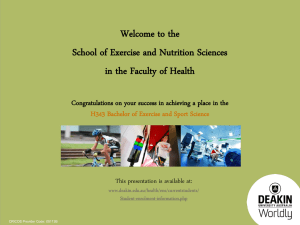First Year at Deakin - First Year in Higher Education
advertisement
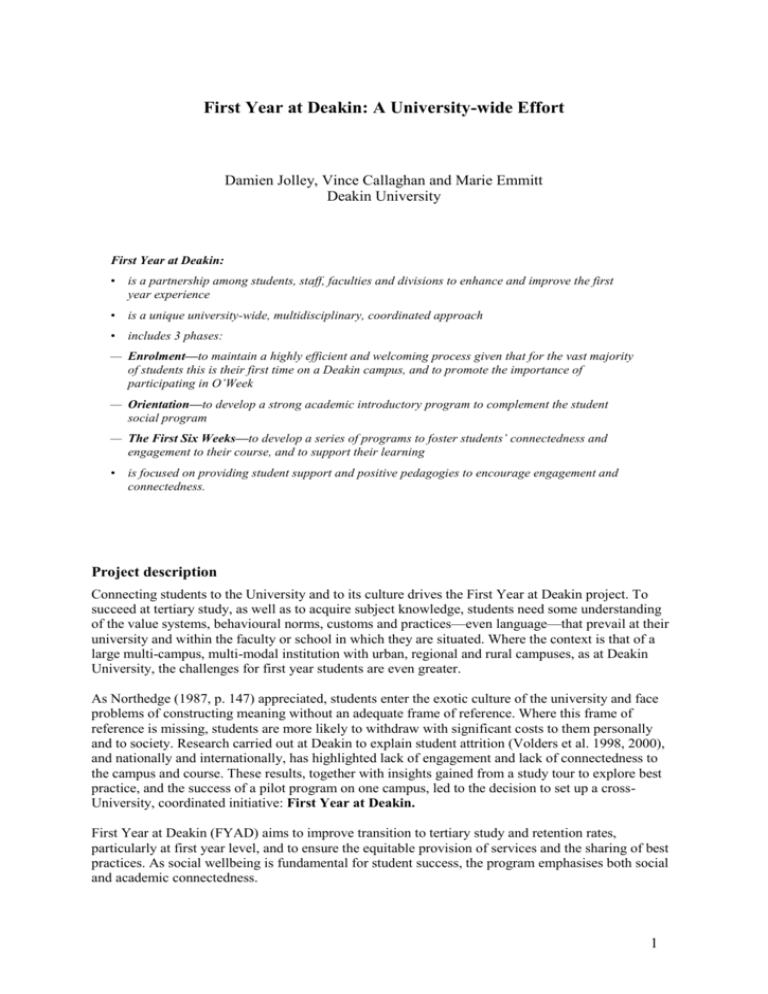
First Year at Deakin: A University-wide Effort Damien Jolley, Vince Callaghan and Marie Emmitt Deakin University First Year at Deakin: • is a partnership among students, staff, faculties and divisions to enhance and improve the first year experience • is a unique university-wide, multidisciplinary, coordinated approach • includes 3 phases: — Enrolment—to maintain a highly efficient and welcoming process given that for the vast majority of students this is their first time on a Deakin campus, and to promote the importance of participating in O’Week — Orientation—to develop a strong academic introductory program to complement the student social program — The First Six Weeks—to develop a series of programs to foster students’ connectedness and engagement to their course, and to support their learning • is focused on providing student support and positive pedagogies to encourage engagement and connectedness. Project description Connecting students to the University and to its culture drives the First Year at Deakin project. To succeed at tertiary study, as well as to acquire subject knowledge, students need some understanding of the value systems, behavioural norms, customs and practices—even language—that prevail at their university and within the faculty or school in which they are situated. Where the context is that of a large multi-campus, multi-modal institution with urban, regional and rural campuses, as at Deakin University, the challenges for first year students are even greater. As Northedge (1987, p. 147) appreciated, students enter the exotic culture of the university and face problems of constructing meaning without an adequate frame of reference. Where this frame of reference is missing, students are more likely to withdraw with significant costs to them personally and to society. Research carried out at Deakin to explain student attrition (Volders et al. 1998, 2000), and nationally and internationally, has highlighted lack of engagement and lack of connectedness to the campus and course. These results, together with insights gained from a study tour to explore best practice, and the success of a pilot program on one campus, led to the decision to set up a crossUniversity, coordinated initiative: First Year at Deakin. First Year at Deakin (FYAD) aims to improve transition to tertiary study and retention rates, particularly at first year level, and to ensure the equitable provision of services and the sharing of best practices. As social wellbeing is fundamental for student success, the program emphasises both social and academic connectedness. 1 FYAD is strongly integrated with University policy and has the support of the University’s leadership. It is included in the University’s strategic plan Taking Deakin University Forward, and is embedded in University policies, encouraging university-wide involvement In particular, it responds directly to objective 12 of the 2000-2002 Teaching and Learning Management Plan of ‘supporting first year students’. In 2001 a senior academic was appointed as First Year Initiative Coordinator and a staff member from the Division of Student Life as First Year Facilitator to lead the initiative, with the intention that all areas of the University would be represented and be active participants in the formation of the program, its implementation and also its review and ongoing development. From the outset, the need to involve students, most especially through the Student Association, was recognised and the strong and ongoing contribution of students has been a hallmark of the program. FYAD is a dynamic, evolving process of continuous improvement. Ongoing monitoring, evaluating and reviewing of activities lead to new priorities for the next implementation cycle and enhancement of current programs. It allows the University to be responsive to identified needs of different first year student cohorts. For example: • For 2002, in the initial implementation, the emphasis was on school leavers as they are the largest intake group (45% of commencing intake). • For 2003, the program emphasised supportive pedagogies for first years, integrating orientation for international students with mainstream orientation, and implementing a coordinated approach to orientation and transition for distance education students. • For 2004, new programs will be developed for off-campus students, in particular a peer mentoring program and a ‘virtual’ orientation program. FYAD has brought together and added to the array of programs developed to support the diversity of students. But it is not only a set of programs—first year as a priority permeates across the University. For example, teaching at first year level is a priority of the academic professional development program, a part of the academic staff induction program, and a special focus for the implementation of the new online platform. The FYAD initiative has led to an environment that supports and values the work of those working with first years, and has been a catalyst for initiating innovative strategies. Not only does FYAD prioritise support for first year students, it also brings first year issues into focus for all levels of the University. It has led to a culture change across the University and, as this application will show, significant outcomes. 2 Figure 1: Multidisciplinary and collaborative approach to First Year at Deakin program Promotes and facilitates equitable student access and progress Deakin’s core commitments include ‘equity and access to higher education for those who might not otherwise enjoy the benefits that flow from such participation’ (Professor Sally Walker, Deakin University Vice-Chancellor, 2003). As part of the FYAD program, we encourage and support potential students to consider university education. A significant percentage (around 50%) of our students are first-generation university students. We have developed information flyers about the support we offer, and are working with key feeder schools to provide on-campus experiences for staff and students in an attempt to bridge the gap between school and university. Deakin University is characterised by the diverse nature of its students. The most recent statistics (2002 cohort) show that Deakin has: • • • • • 12,650 students studying by distance education 4286 international students 5209 students from the Geelong and Warrnambool areas representing a large number of rural students 9810 (32%) of total enrolments aged 30 and above 374 Koorie and Indigenous students. Part of the rationale for introducing FYAD was to develop, through a more coordinated approach that emphasised the role of students as well as staff, a program that was both welcoming and informative and could celebrate and respond to the diversity that is Deakin. For equitable student access and progress to be realised, we believe it is important to provide programs that respond to the identified special learning needs of our various substantive cohorts and these are outlined under our response to criterion 2. 3 FYAD has increased the emphasis on supporting student progress. The O’Week program includes academic programs to support learning such as orientation to available resources, orientation to courses, assessment requirements, library classes, IT classes and return-to-study sessions. An important outcome of the coordinated approach has been increased integration into the academic program of activities offered by the divisions. For example, the Division of Student Life has integrated its ‘Jump Start Program’ with the faculties’ programs, and the liaison librarians spoke at every school/faculty information session at each campus. As noted in the library evaluation (2003, p.6): Another factor that contributed notably to the improved participation rate is a move away from a university view of library orientation as an optional activity. Liaison librarians and others have worked cooperatively with academic staff to re-evaluate the importance of library orientation. For example, in several Schools, the library orientation is integrated with the School’s overall orientation program. In addition, faculties are implementing strategies to monitor and support students’ learning. At the faculty first year pedagogy workshops, practices from other faculties have been shared, and subsequently taken up by others. For example, others have implemented one faculty’s practice of sending a friendly letter offering assistance to students who failed the first assignment. Mentoring has proven to be a valuable strategy. It provides opportunities for students who may be reticent, and hence more readily overlooked, to establish positive relationships, making their needs far more visible and far more likely to be met. Thank you for the time and effort put into making Deakin an accessible university. (Student comment, 2003) Addresses special learning needs To address special learning needs successfully, it is critical to appreciate that the provision of services and appropriate support is but part of the solution. It is essential that students and staff are aware of these services but also that those who use them are comfortable and there is no sense of stigmatism. In this regard FYAD has played a very important role because, from the outset of any involvement with the University, students are aware not only of the services and support they may access and how they can readily do this, but also that the University believes that any student may present with a special learning need at any part of their study and this is something that fits the normative university experience. The University’s approach is based on an inclusive practices framework that ensures each part of the institution accepts responsibility for effective teaching of students with special learning needs. FYAD has assisted the integration of these services throughout the University and has ensured a greater awareness by embedding promotion of these services—and a enriched understanding of what they entail—within FYAD programs. Where there are identified special needs, such as a physical or neurological impairment, inclusive practice philosophy means students often do not have to register with the Disability Resource Centre (DRC) to effectively pursue their studies. Ongoing support for students who register is provided by the DRC, which also acts as a point of information and referral for students and staff. The DRC works closely and inclusively with all parts of the University community, providing students with a comprehensive range of services to assist them in achieving their academic goals, which are now better known by students and staff. A key principle underlying FYAD is that all students will experience transition issues and that seeking help is encouraged at all times. However, we acknowledge that different groups present with particular issues relating to transition to effective university study. Hence FYAD has brought together and further developed a range of programs. 4 Distance education students Via FYAD, distance education students have a variety of options to help them make a smooth transition to university study. These include: • • • • • • • on-campus workshops lasting up to two days, focusing on the range of support the University offers, including introductory academic skills classes to ensure students develop necessary study skills at the outset faculty-based teleconferences to introduce students to key support areas within the University a hardcopy of the comprehensive Distance Education Support Services Guide (also available online) to act as a companion to students wishing to access various parts of the University during their studies interstate orientation sessions offered on a revolving basis by the University and the Deakin University Student Association (DUSA) (Sydney in 2003) a direct email service to all new distance education students (as an extension of Infoflow, which we will discuss later in this paper), providing them with timely information and online academic skills workshops that mirror the classes delivered on campus the Deakin Learning Toolkit CD-ROM, which is distributed to all students and provides distance students with a complete package of the software (and information) required to successfully undertake their studies ongoing access to electronic discussion rooms, mediated by University staff, dealing with transition issues. Specific enquiries are referred to expert areas within the University for response. All University faculties and divisions participated in the design and delivery of these programs. International students Deakin provides an integrated package of services to ensure that international students quickly settle into their new environment and acquire the skills necessary to succeed in a Western academic environment. The package includes: • • • an international orientation program that dovetails with mainstream academic and social orientation (University and DUSA staff deliver this program jointly, and all new international students attend) policies that provide international students with a reserved quota of places in special support classes specific study skills classes that include the frequently highlighted issues encountered by international students studying in a new language and with different academic expectations to those in their country of origin. Regional and rural students Deakin has established measures to ensure that regional and rural students have the necessary support to undertake the transition to university. These include: • • a collaborative orientation program (with University and DUSA representatives) for students moving to Deakin residential accommodation to ensure they establish personal relationships training for residential staff to ensure they have a sound appreciation of the backgrounds of these students. 5 Mature-age students The University conducts a return-to-study program designed to supplement the regular transition program for mature-age students. Return-to-study two-day workshops are offered at the Melbourne, Geelong and Warrnambool campuses. Koorie and Indigenous students Via the Institute of Koorie Education, administrative and academic staff provide an extensive range of services which support Koorie and Indigenous students’ academic endeavours. Services include coordinating the provision of tutorial assistance, ensuring availability of appropriate lecture/tutorial rooms, providing support in the use of computer technology, managing the travel and accommodation needs of students, providing an induction service, and generally being available to advise and respond to students’ specific needs or problems as they arise. By taking on board the pilot programs developed by the Deakin University Student Association, re the needs of distance students, mature-aged students, the extension of the program has made headway in addressing the retention rates of first year students at Deakin. The integration of social and academic programs ensures that all students start their experience at Deakin with the maximum opportunity to feel part of our community, thus increasing their chance for success. (President, DUSA, 2003) Innovative and practical We believe that First Year at Deakin is the most comprehensive transition program in Australia. Other universities offer a range of transition programs, but many are isolated to individual faculties or campuses, and we know of none based on such a close partnership with the student association. We base these claims on a survey of the practice of Australian universities undertaken in 2001—2002, on the number of requests from other institutions for information, and on media interest (see Conclusion for detail). FYAD is innovative and practical in both processes and practices. The processes used in the project’s development and implementation • A leadership team that includes an academic and a general staff member, thus emphasising the • collaborative approach (see Figure 2). This approach brings together expertise and encourages maximum collaboration across the University. In other universities the responsibility for transition generally sits within the administrative rather than academic structures and certainly is not a joint responsibility. Coordination of all parts of the University with the Student Association as an integral partner from the outset. This has ensured full cooperation in planning, implementing, evaluating and determining needs. 6 Deputy Vice-Chancellor’s Office Policy Development Co-ordination Marie Emmett & Vince Callaghan Policy Implementation Division of Student Life O’Week Project Team Project Owner: Vanessa Rohan Project Manager: Ellen Kerr Membership: StudentLife/DUSA/Faculty Implementation of a University-wide orientation program O’Week Campus Teams ● Melbourne ● Warrnambool ● Geelong/Waterfront ● Distance Education First Year at Deakin Advisory Committee University-wide Faculty, Divisional, & Student Association Membership Development of plans relating to enrolment/orientation/transition & to ensure a University-wide coordinated approach Reps on First Year at Deakin Advisory Committee to coordinate Plans/proposals and liaise with Faculty/School/Division/DUSA For enrolment/orientation/transition Membership: DUSA/Faculty/School/Divisonal Coordination & Implementation of orientation activities at campus level Figure 2: First Year at Deakin leadership structure • Effective coordination across all areas and campuses that leads to different areas collaborating or developing complementary activities, and encourages the dissemination of good practices and the efficient use of resources. There is now a much closer relationship/integration among the divisions and the faculties in supporting student learning. For example, the Academic Skills and Career Unit is collaborating with each faculty to adapt the study skills program for specific discipline areas, and many units have implemented assessment tasks that require the use of specific library and IT resources. The coordinated approach facilitates the implementation and promotion of resources to new students. For example, the importance of connecting to StudentConnect (an electronic link to administrative services) is stressed through FYAD. • The approach is underpinned by research and consultation to identify areas of perceived need or gaps and to implement coordinated action to address those needs or gaps. It is practical because the effort is targeted. It has led to a number of research projects and the sharing and dissemination of results that inform policy. • Progressive implementation, evaluation, refinement and extension to new areas of need means that the impact of particular components is documented and improvements are based on knowledge. • Activities included fit within the three phases of Enrolment, Orientation and the First Six Weeks making the program conceptually simple to promote, and containable, workable, sustainable and reproducible. • Involvement of large numbers of students in implementing the program (200 student hosts across the University for Enrolment and O’Week and more than 30 student mentors) makes many of the activities possible, develops these students’ skills, and provides role models and contacts for new students. The range of activities including innovative activities unique to Deakin 7 • The unique Infoflow program was devised to overcome the challenges of dealing with information overload in a new environment. Spreading targeted information online over six weeks reduces the likelihood of information overload for new students, and provides information and advice at critical times in an accessible way. Every University sector, including DUSA, contributes to the six-week program outlined in a weekly diary form. For each of the first six weeks, all first year students receive an email that outlines the important information for that week. Students click through to the Infoflow website from a link provided in the email. • The inclusion of the strong academic focus in O’Week and coordinating the social and academic aspects to different parts of the day has made O’Week more meaningful for many students and provided a jump start’ to university. The academic program is held each morning and includes faculty welcomes, introductory lectures, library and information technology training programs, and academic skills assistance. The DUSA social program occurs each afternoon and evening. • The comprehensive ‘Orientation to Deakin’ website was developed to inform all students about the diverse transition programs available to them. The website includes the Infoflow program, academic skills information, DUSA Orientation Week booklets, the Deakin Learning Toolkit, virtual campus tours, Division of Student Life information and a link to students’ timetables. • The integration of academic support (such as the library, academic skills, IT skills) enables students to better see the relevance of these areas to their studies, enables support areas to help more students more efficiently, and helps academic staff to become aware of how support areas can help their students. • In week 3, ‘Ask Me Week’, posters around the campuses encouraged students to ask questions if they still had concerns, and staff working with first years wore badges to reinforce the message. More than 500 hundred staff (including DUSA staff) wore the badges and there was media coverage of the project. This is a practical response to an identified need. Planning figures for attrition indicate that weeks 3 and 4 are high-risk. Moreover, research (Thies 2002) indicated that many students who withdrew did not realise that they could talk to someone at university about their concerns. Strategies were put in place to encourage students who wished to withdraw to meet with a staff member to ensure they understood all their options. • First year lecturer workshops were developed to encourage all those teaching first years to meet and discuss issues about transition and teaching. One aim was to highlight the differences between teaching and learning at university compared to school and TAFE. Feedback from the 2002 Student Survey informed the discussion. The workshops, besides valuing lecturers’ work in first year, emphasised the importance of connectedness and led to the development of strategies to encourage students to work in groups. • Staff and student peer mentoring programs are new for Deakin and are a practical way to support student engagement. The objectives of the mentoring programs were to improve student awareness of services, establish realistic expectations about university, answer questions in a non-threatening environment, meet other students, and ease the whole transition experience. The role of mentor was to help first year students identify issues and concerns and direct them to the appropriate resource. It was based on the principles of connectedness and engagement. Most faculties now conduct a staff-student mentor program. Staff mentors participated in workshops to assist them in their roles and were issued with a Mentor Kit. Staff also used the Infoflow program as a guide. As one staff member commented: ‘For me the mentoring experience with first year education students was very positive and enjoyable. Our regular chats fostered a sense of connectedness which enabled each group member to settle in quickly and happily to university life.’ Peer mentoring was piloted in 2003. Mentors received training for the program and ongoing support and made a valuable contribution to O’Week faculty sessions as well as to the First Six Weeks. The pilot in the Faculty of Health and Behavioural Sciences was so successful that peer mentoring will be part of all courses in 2004, giving commencing students a positive start to their university life, allowing second and third year students the opportunity to enhance their skills, and giving staff (both academic and administrative) the impetus to provide academic curricula and work practices that will ensure success at first year. 8 I really enjoyed this week and my friends at other unis are jealous. It was really good to meet students in a social setting before lectures. (Student comment, 2003) Students are aware of and use the service First Year at Deakin has built into its programs the promotion and dissemination of the many facets of the initiative to newly enrolling students. Even prior to Enrolment, many prospective students (and their parents) will receive the flyer ‘First Year at Deakin’. It outlines the vast array of programs available to both on- and off-campus students. The flyers are distributed at Deakin Open Days, school visits and Tertiary Information Service exhibitions. Staff members on all Deakin campuses are integral to the dissemination of information to new students. A brochure entitled ‘Playing our part in First Year at Deakin’ was distributed to all staff. The brochure outlined the interdisciplinary approach to our first year students and the vital role that all staff and student representatives play in engaging and connecting the University’s first year cohort. DUSA has had a vital role in the development of the FYAD culture. The three-day Host Training Camp, which trains more than 200 student leaders, develops skills in making students aware of the services available to assist their transition into tertiary life. Students play key roles in all of the three targeted transition time frames: Enrolment, Orientation Week, and the First Six Weeks. Enrolment On Enrolment days student leaders/hosts personally distribute the ‘First Year at Deakin’ flyers and the O’Week brochures, which outline the events taking place during O’Week. This personal contact is advantageous in encouraging new students to see the importance of attending O’Week. The evaluations conducted on Enrolment days by the Academic Administrative Services Division bear out the importance of personal contact by student hosts, and to have as many as 200 students participate was a very pleasing outcome. Enrolling students rated their satisfaction with the leaders at 82% and the knowledge of the importance of Orientation at 76%. Orientation Week The Orientation to Deakin website informs both on- and off-campus students about the diverse transition programs available to them, and the O’Week booklets detail the O’Week academic and social program. The success of the academic program is reflected in the high percentages of first year students attending and returning for the different faculty sessions and their satisfaction rate with the sesions. Across the faculties and campuses, 80% of students attended academic sessions. The Library’s 2003 evaluation gives attendance figures at library sessions during O’Week indicating a significant increase in on-campus student participation in library orientation from 2001 to 2002 and again in 2003. This increase can be directly attributed to the Library’s adoption of specific strategies to support the university-wide approach to First Year at Deakin. Added to this is a well-established strong commitment by the Library to providing students with valuable and effective learning experiences. (Review of Library Orientation 2003, p.6) Programs such as ‘Return to Study’ and ‘Writing at University’ aimed mainly at the mature-aged students were filled to capacity. The numbers attending and the success of the academic programs indicate that students are indeed aware of and do use the services. Such programs have contributed to a dramatic increase in retention rate for this cohort from 37% in 2001—2002 to 65% in 2002—2003. 9 The First Six Weeks As described above, all new students receive information by email in each of the first six weeks of the Infoflow program. The number of student hits in the six-week period was 24 977. By June 2003, 3495 off-campus students had clicked through to the information files attached to Infoflow emails. Students were made aware of the staff mentor program through the ‘First Year at Deakin’ flyer and at the faculty welcomes on the first day of Orientation and throughout O’Week. Interested students were allocated to an academic staff member for semester 1 with a particular focus on the first six weeks. In 2003 two student peer mentoring programs were piloted—one through DUSA which involved more than 30 students as mentors (see criterion 5). The pilot program included 22 mentors from the Faculty of Business and Law at Geelong, where 50% of enrolled students applied for the program, and five mentors from the Faculty of Science and Technology at the Geelong Waterfront campus, where 40% of enrolled students applied for the program. In addition, the Faculty of Health and Behavioural Sciences was funded for a peer mentoring pilot program in 2003 for students undertaking the Bachelor of Applied Science (Health Sciences). Two masters students were appointed to share the project management role for six months (until the end of semester 1, 2003) and current students were invited to be mentors. A full-day workshop was held with mentors, program managers and members of staff from Student Life. There are currently 7 mentors and 39 mentees enrolled in mentor groups, each of which contains between 6 and 12 students. For new international students, study skills classes were offered through Deakin International, faculties or through the Division of Student Life. By the end of the first quarter 2003, 1412 international students had attended these non-compulsory classes (averaging 1.5 sessions per international student). It’s good to have such a program that helps and encourages students to focus more on time management. (Student comment, 2003) Students have been integrally involved in the development and implementation of the program The Deakin University Student Association (DUSA) has been an integral partner in the development and implementation of the program from its conception. Student representatives were on the initial action team researching best practice, on the Advisory Committee responsible for determining program priorities and guidelines and coordination across the University, on the O’Week Project Team, and on the O’Week campus teams including off campus where many of the policies and programs are operationalised. These committees, as well as being effective in the implementation, have also allowed for effective problem solving through the wide range of perspectives available, in particular the student perspective. Student involvement has been significant in each of the three phases of FYAD. • At Enrolment DUSA provides entertainment and guidance for the new students, distributes information about O’Week, and some students run sessions on how to connect to StudentConnect. • DUSA takes responsibility, with input from key staff in the faculties, for coordinating the academic and social program for O’Week, publishing the O’Week booklet, and organising the social program for the afternoons and evenings. The social program is central in assisting students to connect with the University and campus. The Division of Student Life and DUSA have worked together to develop a program that de-emphasises the ‘boozy’ perception of O’Week, and that caters for the needs of the range of students. Prior to O’Week, students run a Host Training Camp 10 for more than 200 student leaders from all faculties and campuses to develop skills to be effective in making new students aware of the services available to assist them in transition to university. The president of DUSA is part of the formal University welcome and students contribute to the faculty sessions. • In the First Six Weeks DUSA contributes to orientation activities for off-campus students. DUSA contributes to the information on the Infoflow program and DUSA representatives were integral to the implementation of the multidisciplinary approach to ‘Ask Me Week’. • DUSA, with the support of the Advisory Committee, has developed a student peer mentoring program. The Student Association program was initiated as a result of DUSA’s Education Committee’s concern with the drop out rate of their members. DUSA has played a key role in the planning and implementation of FYAD, and importantly, in the evaluation of programs. Students contributed to the development of the evaluation tool for O’Week and the comprehensive student survey of the students’ experience of transition. I was quite apprehensive about transitioning into the uni. However I was overwhelmed about the diverse range of facilities and I was amazed by the positive help/useful knowledge I received. (Student comment, 2003) Students’ satisfaction Receiving feedback from students is central to informing developments for the next phase of FYAD’s implementation. Each year there has been a comprehensive evaluation of the different phases of FYAD with feedback collected from DUSA and the broader student body and the faculties and divisions. Because students who participated in a mentoring program responded more positively to every question in the ‘University and academic orientation’ section, and most of the questions in the ‘Your first assignment’ and ‘University experience’ sections of the Survey, FYAD will focus on mentoring in 2004. Student satisfaction can be ascertained from student attendance at and responses to the different phases and from increased awareness and usage of resources as evidenced below. Significantly, the Student Association is most supportive of the program and sees its value in working at grassroots level to make a difference. Student Administration undertakes a detailed evaluation of enrolment. The students surveyed in 2002 and 2003 were highly satisfied with the process. For example, there was high satisfaction with the professionalism and courtesy of staff (95.2%), with the knowledge of the advisers (97.8%), and with the adequacy of the information regarding O’Week (88.6%). I felt very welcomed at Deakin on enrolment day. The enrolment system was made as simple and stress free as it could possible be and the helpers were extremely kind and helpful some to the extent that they could notice a lost face and come and help without you needing to ask. The preenrolment session was good to meet your lecturers and have a chance to meet other people in your course. This gives you more confidence because you know a face. (Student comment, 2003) DUSA carried out the student evaluation of O’Week. 90% of students enjoyed O’Week and felt that the program was effective in helping them feel welcomed, 86% believed that the program assisted them to make connections with their faculty, and 84% agreed that the program helped them to feel more prepared for life and learning at university. They indicated that the information provided was greatly appreciated and useful and they felt reassured by knowing so much help was available. What was most valuable was connecting with faculty staff and students. The tour and the introductory lectures were very helpful in letting us know about our subjects and 11 getting to know our way around. I am not scared of Deakin Uni anymore. O’Week was very valuable in that I was introduced to the Uni and what is on at Uni I was so nervous before orientation but after that I felt free. (Students’ comments, 2003) The First Six Weeks/transition experience is evaluated through the Student Survey. In 2002 and 2003, 2000 randomly selected students from across all faculties and campuses were surveyed after the first six weeks for their responses to the transition experience. Overall, students were very positive about their experiences and gave us valuable feedback about their perceptions of studying at university which has been vital in informing the pedagogy workshops and shaping activities. Because of the desire to be responsive to student perceptions, key areas (in which it was determined from the 2002 survey that more needed to be done) were targeted for 2003. While continued development is still required, the comparative tables show significant improvements, especially in Orientation week. It is encouraging to see a 17% increase in how the academic sessions were regarded and a 10%+ improvement in the faculty welcomes, the clear explanation of study expectations and that students fully understood the expectations of the first assignment. As reported under criterion 4, hits and feedback for the Orientation website and Infoflow have been very positive. Students were most appreciative of having the opportunity to receive important information in ‘bite size’ pieces and to be able to return to the information as they needed it. Infoflow has certainly helped students feel more connected and less overwhelmed. I found this extremely helpful. I was told much of it when I started but it went straight over my head. It is good to be able to read it all again and again. I have found Infoflow very useful in settling into my first year at Deakin. I have found the website useful and the contacts (email, website, in person) easy to access and extremely helpfuL It’s great to see Deakin working towards making each and every student’s experience a success. An excellent way to reduce student anxieties. Very helpful things I didn’t know about and helps me to feel part of the community (off-campus student) My levels of apprehension are dwindling. (Students’ comments, 2003) Mentoring has been very effective in supporting students in the transition. Their comments indicated that they found it very valuable in meeting students in their course and having a venue to share concerns they might be having. Mentors also expressed how the students in the mentor groups were able to provide support for each other. As a country student I didn’t know anyone on campus and I thought that joining a group would be a good way to meet other people, and it sounded like an easy way I could express any problems I might have. It worked for me. I love uni and am doing well (2003 student in staff mentor group) The student mentors indicated in the evaluation of the project that the social connectedness was a high priority for the students. For most people it is seen as the biggest problem they had was finding a ‘group’ of friends to hang around with, like what they had a schooL They just wanted to find people in lectures and tutes so they weren’t alone which seemed funny in a way because everything else about uni was fine. We discussed work, relationships and uni with each other—Friendships at Uni are still a big thing on the agenda. I asked what they liked about the group and the biggest response was meeting people. 12 That cannot be learned from any ‘guided tour’ so it was definitely worth it. (Student mentors’ comments, 2003) Conclusion First Year at Deakin, implemented in 2002, resulted in: • declining attrition in semester 1 and increased retention rates • increased awareness of transition issues • increased involvement by academic staff and also students in programs to support student learning of first year students. In addition, the program has been instrumental in collecting information, evaluating programs and publishing the results, which have been used to inform policy at different levels throughout the University. The semester 1 attrition rates indicate that student withdrawals over the two years have declined by 22% for all commencing undergraduate students, and by 32% for those ‘new to higher education’. The retention figures to second year also indicate a considerable improvement over two years of 18.5% for all commencing undergraduate students and 22% for those ‘new to higher education’. The University now retains 78% and 79% of these students respectively in comparison with 73% before the program commenced. First Year at Deakin is characterised by its breadth and depth. Its coordinated multidisciplinary, multicampus approach to transition to university has been successful in changing a culture and achieving its aims in a very short time. The approach is more comprehensive than elsewhere with a number of unique, innovative and practical features. It has been a model for other universities (ten universities have contacted us for further information about the program or to meet to discuss the program and we were asked to place the 2002 report on the University of Melbourne Asia-Pacific First Year website). The program has been well received by the public press with a number of articles including references to the program (three in 2003 with others forthcoming). As a result of their request, we met with Army Reserve personnel to discuss strategies for retention. References Northedge, A, 1987, ‘Returning to study’ in Thorpe, M. & Grugeon, D. (eds), Open Learning for Adults, Longman Open Learning, Harlow, pp. 147-62. Thies, L. 2002, ‘Patterns and causes of first year student withdrawal’, Deakin University. Volders, A., Thies, L. & Callaghan, V. 1998, ‘Report into the progress of first year on-campus students on the Warrnambool campus in first semester 1998’, Deakin University Volders, A., Thies, L. & Callaghan, V. 2000, ‘A Jump Start First year strategies project report’, Deakin University. ... 13
